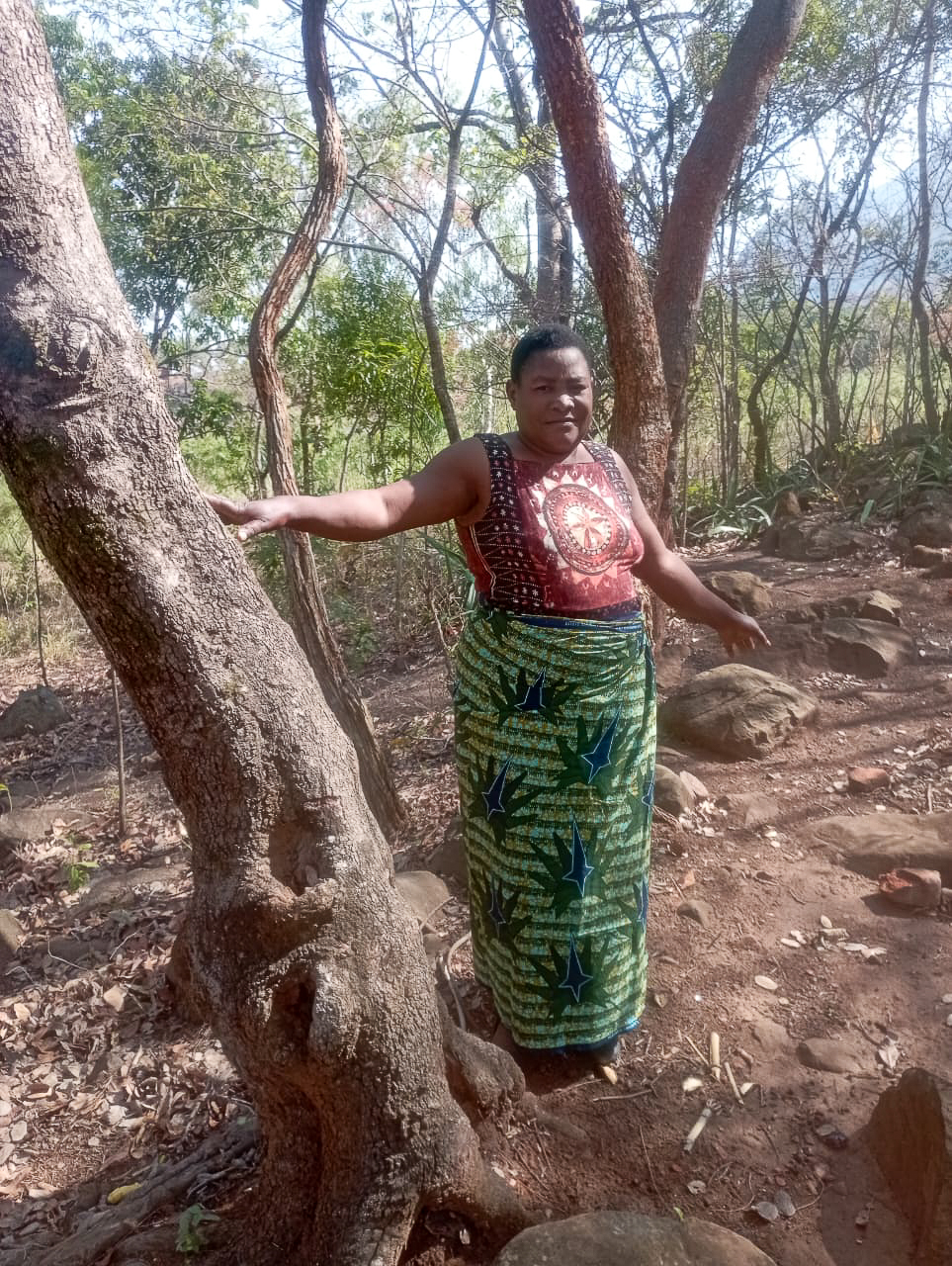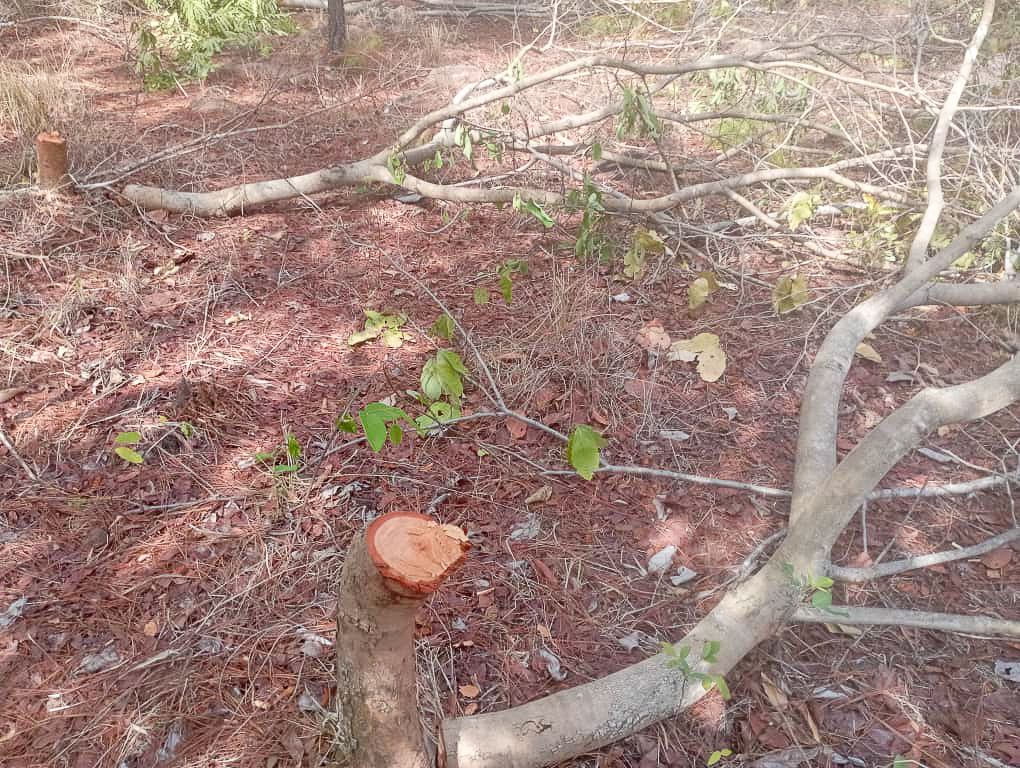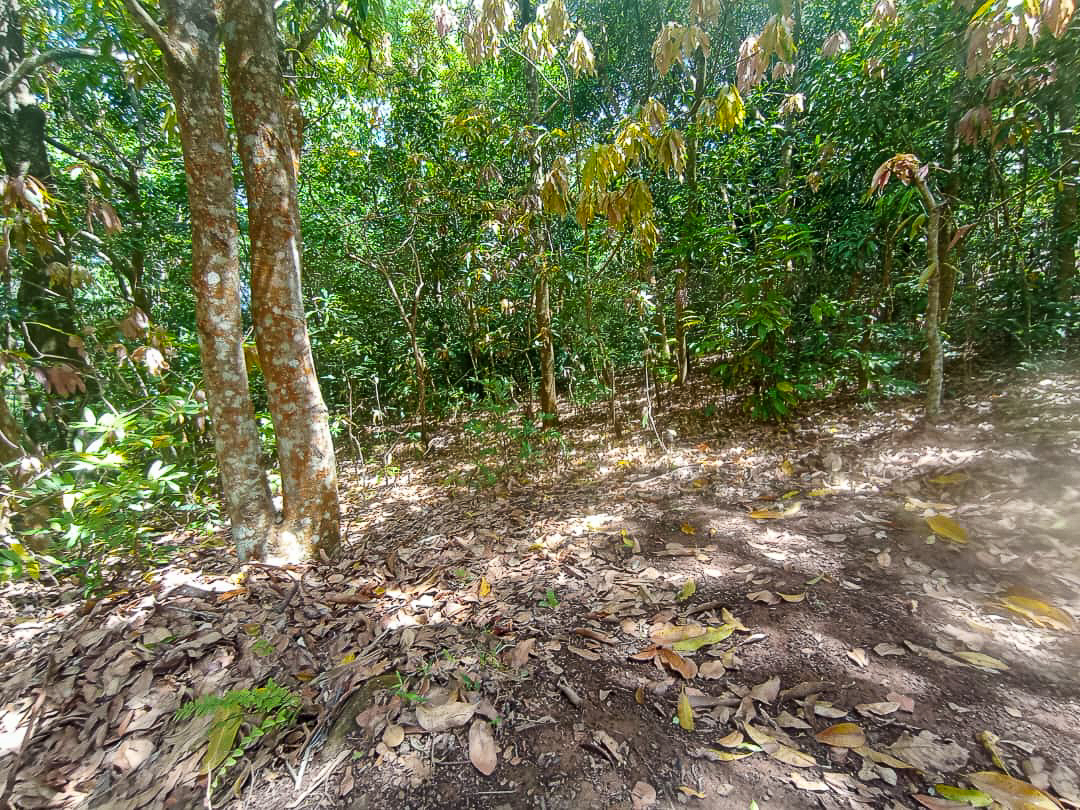After the cedar disappeared, the mining came
How ‘thieves in government’ are ravaging Mulanje mountain
Located in Malawi’s southern region, near the Mozambique border, Mulanje is the country’s highest mountain and the source of several rivers that support hydroelectric power generation and agriculture. Bananas, pineapples, cassava, and sweet potatoes, along with cross-border trade with Mozambique, sustain the livelihoods of nearly 700,000 people in surrounding communities.
But it was always the cedar tree that symbolised the real wealth of this area. Besides providing shade for the crops, it also served as a tourist attraction, generating income. Locals used it to make furniture. Yet, as community elders attest, it has been and continues to be destroyed by illegal loggers in collusion with government officials.
“There were stories about people stealing the trees”
“My parents made doors from cedar trees when I was young. They used to say they would last a thousand years without termites infesting them,” says Nakhonyo, now 39, the village chief of the Nakhonyo area and bearer of the traditional name shared by all village headmen and -women. Nearly a quarter of a century ago, when she was a 15-year-old girl known simply as Ruth Jali and had just left school, she began noticing the cedars disappearing. “There were stories about people stealing the trees.”
Little did she suspect then what she says she knows now: that the thieves have allies in her own government.
An uphill challenge
The awareness came later, when, as village head, she dedicated much of her life and work to defending the remaining cedars. "It had never crossed my mind that I would become a leader," she says. "But my uncle—who was Village Headman Nakhonyo at the time—took me by the hand." She participated in the local development committee, which, along with counterparts from other villages, made decisions on infrastructure and water issues. She received training in forestry management from a local conservation NGO. In 2008, she and other trained leaders were empowered by the government to protect endangered forest areas.
Now village head, she led a security committee that patrolled the Nakhonyo cedar forest, a two-hour walk from the village. Anyone found logging was required to plant 50 to 100 trees as punishment. “This was my moment to prove my passion for the environment and our community’s commitment to preserving the area as a treasured tourist destination,” she says.

Seven trees left
Sadly, much damage had already been done by then. Most mature cedar trees—which had taken centuries to grow—had been taken out by ‘banya,’ the name the community gave to the thieves, locals and non-locals in cahoots with foreign traders, who made a good living from selling the resource. In 2017, two years after the villagers began replanting cedar from seedlings donated by the local environmental NGO, the Mulanje Mountain Conservation Trust (MMCT), reports would state that only seven mature cedar trees remained on Mulanje Mountain. By then, Nakhonyo had become convinced that the government did not care; worse, that it was complicit with the thieves.
Nakhonyo says she repeatedly asked the District Forest Office (DFO)—the government branch officially tasked with protecting and patrolling the woods—to fulfil their role alongside the voluntary efforts of the villagers. However, she claims that DFO patrols either did not materialise or seemed to work at cross-purposes with her team. “Firstly, they always say they need allowances (1) before they can do anything,” she says angrily, “while we work voluntarily. And even when they do come, when these armed forestry officials are here, we receive more reports of logging instead of fewer.”
“The patrols went to the wrong places”
It led Nakhonyo to suspect that some DFO officers might be colluding with the logging syndicates, and possibly with other law enforcement agencies as well. “When I requested army and police deployment in the area, some officers went to protect the wrong locations, which to me seemed deliberate. It appeared they knew exactly what they were doing.” Her suspicion is shared by another village elder, Samuel Elija, patron of the local Muonekera Cedar Conservation Club, which advises several cedar nurseries in the area. Elija is convinced that “some patrol officers are tipped off by the loggers in advance about which side of the mountain they will be patrolling. Then the loggers move to the other side.”
He adds that the damage extends way beyond the loss of the trees alone. “People who used to work as guides for tourists and visitors coming to see the forest are now unemployed.”
Nakhonyo and her fellow elders kept reporting and knocking on doors until, in 2022, the forestry office took away their authority over the area. “There has been lots of logging in Nakhonyo recently, now that I don’t have control anymore,” she says dejectedly. “As a traditional leader, I’m losing interest because I feel I have laboured in vain. Where we initially replanted, the ‘banyas’ are logging again and even making fires to create clearings. Nobody wants to hear us out.”

‘Whites with money’
Mulanje Mountain Conservation Trust (MMCT) director, Carl Bruessow, confirms that his NGO has raised similar concerns, both directly with the government and through the media over the years, with little result. “We provide seedlings, but there is little more we can do”, he says. Bruessow does not want to comment on reports that the government is delaying its response to MMCT’s proposal for a Public Private Partnership (PPP), in which the mountain forest would be managed collaboratively by the government and the NGO.
“Politicians want to steal everything from the mountain”
During this investigation, some inhabitants of Mulanje Mountain expressed their frustration with the MMCT, accusing the NGO of doing too little to support the area. They argued that, given the organisation’s reputation as being run by "whites with money," it had the resources to contribute more. However, a well-placed MMCT source, who requested anonymity, countered that the government is hindering the NGO’s involvement in forest management. “The officers working in government are reluctant (to approve the MMCT proposal for a management partnership) because they are benefiting from illegal logging,” the source said, adding, “There is no political will to conserve the forest.” He suspects that "politicians and other powerful figures want to strip the mountain of its resources and then hand it over to MMCT in a dilapidated state.”
The source also stated that he had information indicating that “locals desperate for work” are paid the equivalent of “less than a US dollar per tree by certain DFO officers, who then sell the trees for around US$15.” As a result, the MMCT’s donors are becoming increasingly reluctant to fund its efforts. “They say the trees keep disappearing anyway because of the thieves in government.”
The blame game
Asked to comment, Mulanje District Forestry Officer Newton Sodala says his office “does not have records of any logging” and that it “relies on MMCT data.” Denying any involvement by forestry officials in illegal logging, Sodala added that he was new to the office and was not present when much of the cedar disappeared. He insisted that his office conducts regular patrols and that allowances are only granted on special occasions. He blamed “communities who engage (out of poverty) in illegal activities” like logging. “Whenever we conduct patrols in those areas the communities are hostile,” he said, calling the criticism of his office a “blame game” and complaining that “communities deny responsibility” and “push the issue to politicians and the MMCT. Meanwhile, the cedar is gone.”
Sodala also denied that the DFO took the forest management away from the village elders. "This is a government arrangement endorsed by all traditional leaders," he said. “The management (…) is now under Group Village Heads (who are superior to village heads like Nakhonyo).” He added that “the community does not understand the co-management arrangement” and that “they want to get involved in everything at the DFO.”
Mining threat
Meanwhile, a new threat has emerged for Mulanje. A mining company, allegedly linked to the president’s son, has been investigating the presence of rare earth minerals and bauxite on the mountain. The Ministry of Natural Resources and Climate Change asserts that Akastwiri Holdings Ltd is merely "sampling," but many local elders, including Nakhonyo and Samuel Elija, remain unconvinced. “We heard what was happening through the grapevine. We were never consulted about anything,” says Elija. “Now, their digging could contribute to flooding during the rainy season.” Fellow elder, Chief Nthilamanja, has also voiced serious concerns, telling ZAM, “These (digging) activities will make this mountain a death trap. The movements will cause floods during cyclones, and the cost will be on our communities.”
The mining will cause floods during cyclones
Platform for Investigative Journalism (PIJ) Malawi recently published reports that Akastwiri Mining Limited flouted environmental procedures to obtain the exploration license six years ago, in 2018, and that it was able to do so because of its links to President Lazarus Chakwera’s son, Nick. Although Nick Chakwera has denied any involvement with Akastwiri, speculation persists, fuelled by the unexplained advantages the company appears to have gained. Civil servants from the relevant offices, interviewed for the report, revealed that the company circumvented both the Director of Agriculture, Environment and Natural Resources, and the district environmental subcommittee, securing the license solely through the Mulanje District Executive Committee, which was reportedly aligned with Akastwiri.
According to sources, Yaz Nyirenda, the Director of Agriculture, Environment, and Natural Resources, who had attempted to enforce proper procedures, was initially threatened with a lawsuit by Akastwiri’s lawyers for “obstructing the company” in its operations on Mulanje Mountain. Later, after Akastwiri dropped the suit, Nyirenda was suspended for fifteen months, reinstated, and subsequently transferred to northern Malawi in 2024. “Nyirenda was never given a chance to present his side of the story. But still, Akastwiri had too many shortcuts,” said the source.
“Akastwiri had too many shortcuts”
Akastwiri Holdings Limited Executive Director, Hilton Banda reacted angrily when he was approached on WhatsApp. “There’s no controversy. Whoever is paying you to create controversies is the one who is controversial! We are going ahead with operations on Mulanje Mountain. Ask the mining department…” he said before cutting the call.
The threat to the mountain
The mining plans are likely to jeopardize Malawi's application to have Mulanje Mountain listed as a UNESCO World Heritage site. This process, which began in 2000, has not yet been successful, as Malawi has twice failed to provide complete responses to UNESCO’s queries. A country is permitted to submit its nomination dossier only three times for each potential heritage site. "If it fails on all three attempts, it has exhausted its chances for that site," said Dr Lovemore Mazibuko, Director of the Department of Museums and Monuments in the Ministry of Local Government, Unity, and Culture. The final attempt is currently under review. In August, UNESCO sent a mission to Malawi to verify the information submitted, engaging with various stakeholders in the NGO sector, local leaders, and government. The outcome is yet to be determined.
Lecturer in Ecology at the Malawi University of Science and Technology, and National Chairperson of the Wildlife and Environmental Society of Malawi, Dr Tiwonge Mzumara-Gawa says that, after the massive loss of the cedar, Mulanje Mountain “can’t afford to keep losing more. It’s still a biodiversity and tourism hotspot and sustainable tourism could last longer than bauxite mining.”
Lack of transparency
In response to questions, Malawi’s Mining and Mineral Regulatory Authority (MMRA) stated that although Akastwiri applied for a full mining licence, it was only given an exploration licence, which expired in October 2024. “The full license is still subject to an environmental impact assessment,” says MMRA Director General, Samuel Sakhuta, adding that both mining and tourism issues are “within the Agriculture, Tourism and Mining Strategy” and that the government will judge “all issues in a context of social economic development of the country.”
MMCT director Carl Bruessow remains concerned that destructive mining may well happen. “There are over 500 unique species on this mountain. It’s disheartening that there are even considerations of having mining ventures in such a unique place.” He adds that “there has been lack of transparency in the whole thing. In the PowerPoint presentation, Akastwiri shared with the Ministry of Mining, they claim to have provided potable water, improved access roads, and undertaken afforestation efforts. But that is all rubbish. They have done nothing like that; ask anyone around here. Instead, they have been coming with people carrying guns who bully the communities and force them to stay away." He confirmed that no environmental impact assessment has yet been done regarding the mining plans.
(1) According to the DFO, special allowances are sometimes, but not always, paid to the forest patrols. Nakhonyo however states that the patrol members always insist that they cannot go out without allowances.
See all stories in this investigation:
Africa’s political elites’ deforestation scam | Main story
Nigeria and Uganda | Western “green” funds used for “merrymaking with ministers” while forests are cut down
Mozambique | The destruction of Quirimbas Park
Ghana | Despite much ‘green’ planning and funding, the political elite still mines the forests
Cameroon | The timber mafia omerta

Josephine Chinele is a multi-award-winning investigative journalist who has worked for newspapers, radio, and television platforms in Malawi, Tanzania, and South Africa, and as a fellow for the Los Angeles Times in the USA amid other international journalism fellowships. She is passionate about sexual reproductive health and rights issues, having reported on the topics for over 15 years.
Call to Action
ZAM believes that knowledge should be shared globally. Only by bringing multiple perspectives on a story is it possible to make accurate and informed decisions.
And that’s why we don’t have a paywall in place on our site. But we can’t do this without your valuable financial support. Donate to ZAM today and keep our platform free for all. Donate here.


